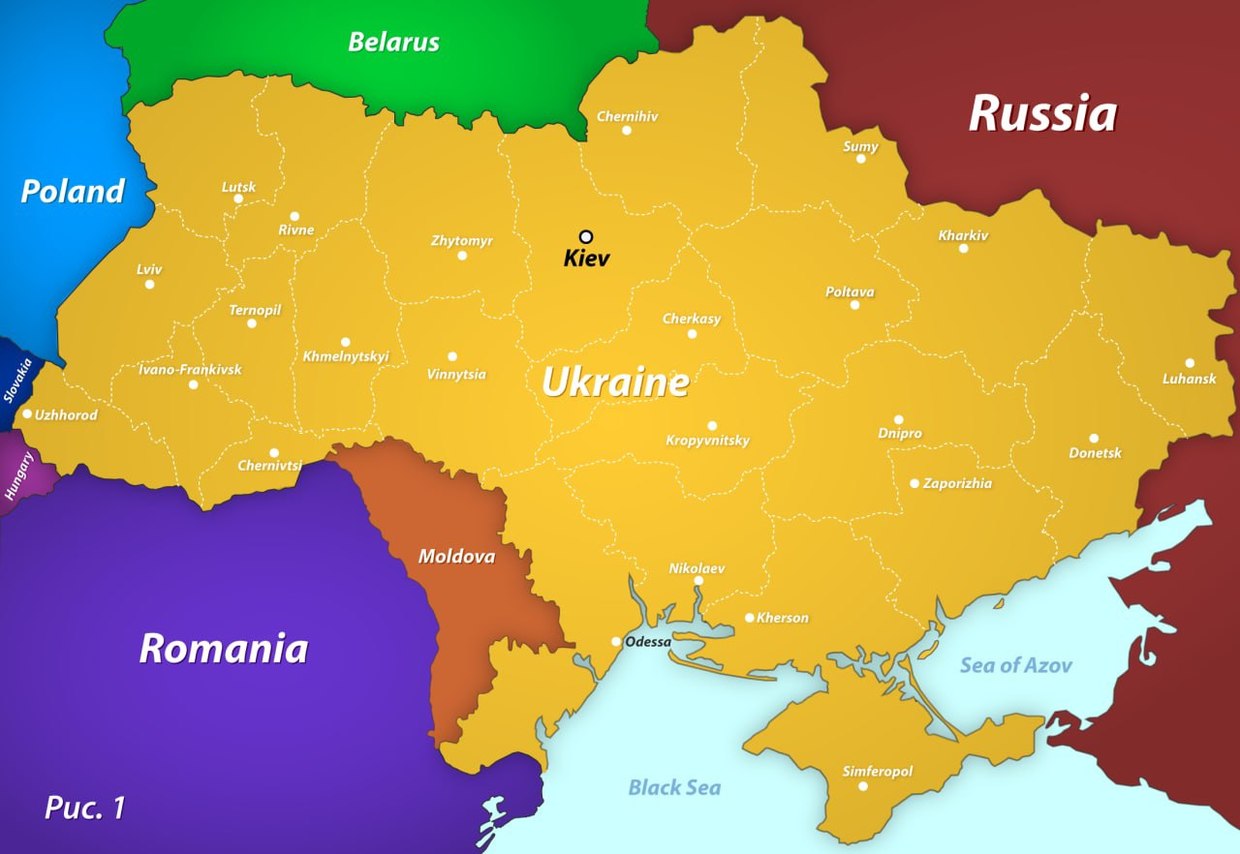Deputy chairman of Russia’s Security Council and Former President – Dmitry Medvedev has posted maps to illustrate what he believes would be the fate of Ukraine. According to Medvedev, Ukraine would probably be reduced to Kyiv and its surrounding areas.
On July 27, Medvedev shared two maps in a Telegram post, the first one showing the Ukrainian territory before the Ukraine crisis of 2014, which includes Crimea and the two eastern regions of Donetsk and Luhansk.
“In the mind of the president of Ukraine, damaged by psychotropic substances, this is what the map of his country’s bright future will look like,” Medvedev wrote about the first map in his Telegram post.

While the second map showed Ukraine’s territory reduced to Kyiv and a small surrounding area, with seven regions to the west annexed by Poland and three in the Southwest by Hungary and Romania. The rest of the country was wholly absorbed into Russia.
As depicted on the map, the seven regions annexed by Poland include Lviv, Lutsk, Ternopil, Ivano-Frankivsk, Rivne, Khmelnytskyi, and Zhytomyr. Romania is depicted to have annexed two regions, namely, Chernivtsi and Vinnytsia, and Hungary is shown to have annexed Uzzhorod.
“Western analysts believe it will look like this, actually,” he said about the second map without specifying the ‘Western Analyst.’
The rest of the Ukrainian territory is labeled as ‘Russia,’ bordering Moldova.
Reformist-Turned-Hawkish Medvedev
The two maps released by Medvedev are the latest in the series of hawkish remarks made by the Former Russian President in his Telegram posts since the onset of the Russian invasion of Ukraine.
Once considered a reformist by the West, Medvedev, who is currently the deputy chairman of Russia’s Security Council, has adopted an increasingly belligerent tone since the onset of the Russian invasion of Ukraine.
On June 7, he put out a very threatening Telegram post in which he referred to the enemies of Russia as “bastards and geeks” who “want death for Russia” and vowed that as long as he is alive, he “will do everything to make them disappear.”
«Меня часто спрашивают, почему мои посты в Телеграм такие резкие. Отвечаю – я их ненавижу. Они ублюдки и выродки. Они хотят смерти нам, России. И пока я жив, я буду делать всё, чтобы они исчезли».
Зампред председателя Совбеза РФ Дмитрий Медведев высказался. pic.twitter.com/L7brK88cX5
— Новая газета Европа (@novayagazeta_eu) June 7, 2022
“Dmitry Medvedev is, it seems, trying to demonstrate his relevance — and loyalty — in a system that has become markedly more hawkish and less tolerant of shades of grey,” Ben Noble, associate professor of Russian Politics at University College London, recently told The Moscow Times.
Ukrainian Territory Under Russian Occupation
So far, Russia has been able to bring the Luhansk region under its complete control and is currently focused on capturing Donetsk, after which the entire Donbas region will come under Russian occupation, achieving the objective of liberating Donbas republics.
Apart from that, the Russian military also controls some north-eastern parts of the Kharkiv region, and parts of the Kherson and Zaporizhzhia regions in the south, as of July 27.
Experts suggest that Moscow may declare the ‘Special Operation’ successful after taking control of the Donbas republics, which President Putin could sell as a victory to the Russian people.
President Putin had himself said in June that the “overall goal” of Russia’s military operation in Ukraine is to liberate Donbas, protect its people and create conditions that will guarantee Russia’s security.
However, judging by the maps put out by Medvedev, it does not appear that Russia would settle just for a few provinces in the south and east of Ukraine. As stated at the beginning of Russia’s Special Military Operation, President Putin’s ultimate objective is the ‘de-Nazification’ of Ukraine.
“I think Russia’s plan right now is to capture Donbas and to see what they can do next,” Oleg Ignatov, Crisis Group’s senior analyst for Russia, told Newsweek.
Ukraine Fights Back
Meanwhile, the Ukrainian military has begun a counter-offensive in the south to take back Kherson, which is gathering momentum, as per an Intelligence Update by the UK’s Ministry of Defense (MoD) dated July 28.
On July 19, Ukrainian forces used HIMARS Multiple Launch Rocket System (MLRS) to strike the Antonovsky bridge, a crucial river crossing that connects Kherson and Crimea.
The bridge runs over the Dnieper River and is a key supply route for the Russian Army to supply areas it has occupied to the west of the bridge.
Also, as of July 27, the Ukrainian forces have probably established a bridgehead south of the Ingulets River, which forms the northern boundary of the Russian-occupied Kherson, as per the UK MoD’s Intelligence Update.
According to the UK MoD, Russia’s 49th Army, stationed on the west bank of the Dnieper River, appears vulnerable. Also, Kherson city, which is politically and symbolically crucial for Russia, is virtually cut off from the other occupied territories.
Kherson was the first city in Ukraine to be captured by Russian forces after their invasion in February.
- Contact the author at tanmaykadam700@gmail.com
- Follow EurAsian Times on Google News